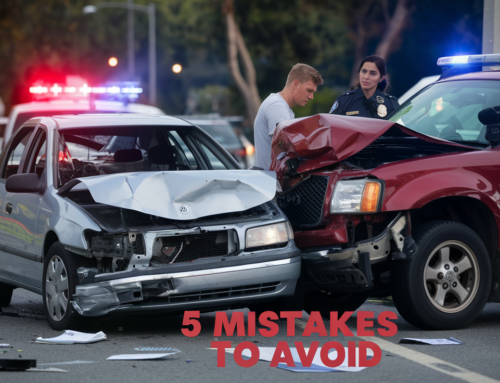Your entire world turns upside down in 3 seconds flat. That’s the average time it takes for a car crash to shatter your normal day and thrust you into a maze of insurance adjusters, medical bills, and legal jargon.
I’ve seen too many decent people get steamrolled after accidents simply because they didn’t know what to do in those critical first hours after a car crash.
This step-by-step guide will walk you through exactly how to protect your rights after a car crash – without getting bullied by insurance companies or making mistakes that could cost you thousands.
The difference between getting what you deserve and getting taken advantage of often comes down to the actions you take in the first 48 hours. Let me show you what most lawyers wish their clients had done before walking through their door.
Prioritize Safety and Call 911
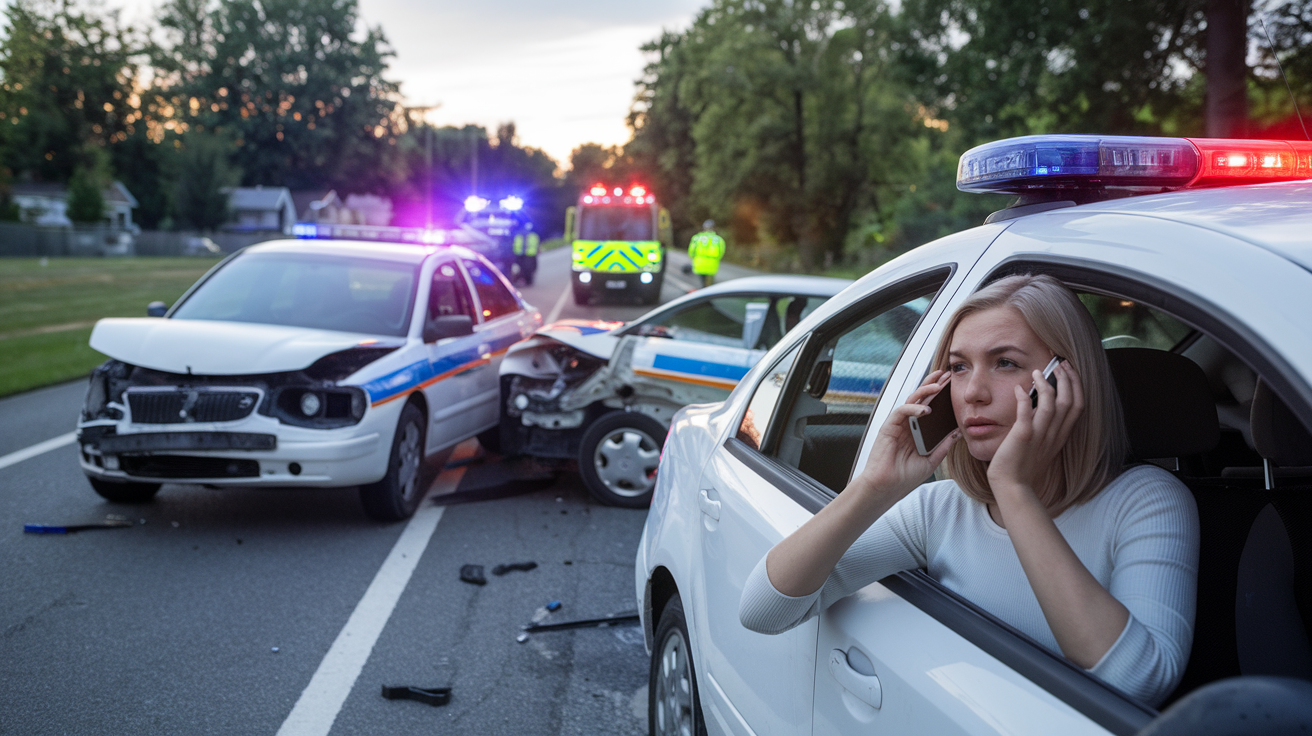
When you’re in a car crash, the moments that follow matter tremendously. Your actions in these first few minutes can impact everything from your physical recovery to your legal rights.
The First Critical Steps
Your safety comes first—always. After impact, take a deep breath and check yourself for injuries. If you can move without pain, check on your passengers and others involved in the crash.
Don’t try to tough it out or downplay what just happened. Car crashes trigger adrenaline that can mask serious injuries. What feels like a minor twinge now could develop into debilitating pain hours later.
Making the 911 Call
Even in seemingly minor fender benders, calling 911 is essential. Here’s why:
- Police documentation creates an official record of the incident
- Emergency responders can evaluate injuries you might not be aware of
- Officers can secure the scene to prevent further accidents
- The police report becomes crucial evidence for insurance claims and potential legal action
When you call, speak clearly and provide your exact location. Mention if anyone appears injured, if vehicles are blocking traffic, or if there are hazardous conditions like leaking fluids or deployed airbags.
While Waiting for Help
Stay at the scene. Leaving before police arrive could constitute a hit-and-run—even if the crash wasn’t your fault.
If it’s safe to do so, move your vehicle out of traffic. Turn on your hazard lights and set up emergency reflectors if you have them.
Don’t apologize or admit fault, even if you think you might have caused the accident. Your perception in the moment might not account for all factors involved, and statements made at the scene can be used against you later.
When Emergency Services Arrive
Tell the responding officers exactly what happened, sticking to facts. Avoid speculating about what other drivers might have been doing.
Request medical evaluation even if you feel fine. Many serious injuries—like whiplash, concussions, or internal bleeding—don’t show immediate symptoms.
Get the responding officers’ names and badge numbers, and ask how to obtain a copy of the police report.
The Medical Priority
Never refuse medical attention at the scene. Some injuries can be life-threatening without obvious external signs. Brain injuries, internal bleeding, and spinal damage might not cause immediate pain.
If paramedics recommend transport to a hospital, go. If they don’t, still consider visiting an emergency room or urgent care facility that same day.
Remember: documentation of your injuries immediately after the crash creates a clear connection between the accident and your condition, which becomes invaluable for any future claims.
Try to Gather Information
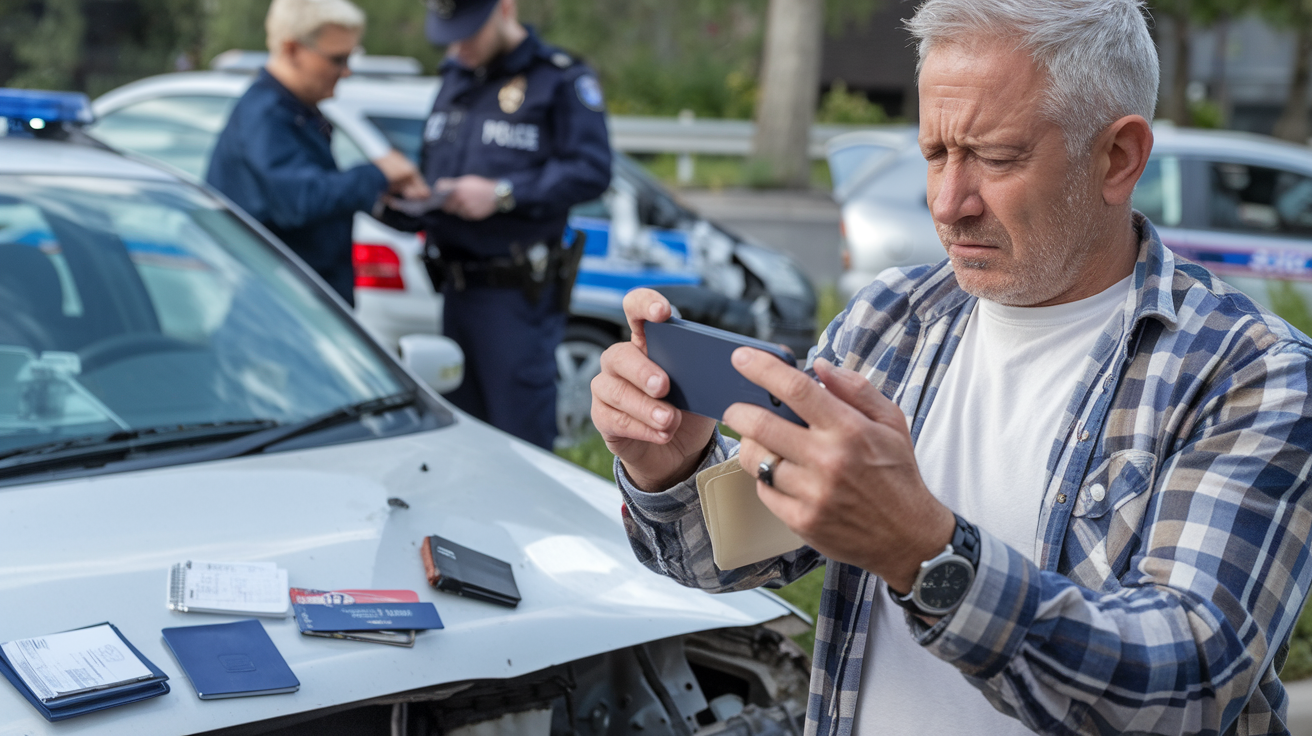
Collect Evidence at the Scene
The moments right after a crash are chaotic and stressful. Your heart’s racing, maybe you’re hurt, and you’re probably not thinking clearly. But these first few minutes matter a lot for protecting your rights down the road.
Grab your phone and start taking pictures of everything. I mean everything:
- The damage to all vehicles from multiple angles
- The entire accident scene, including the road and surroundings
- Skid marks or debris on the road
- Traffic signs or signals in the area
- Weather and road conditions
- Your injuries (even minor ones)
Photos are gold. They don’t forget details or change their story later.
Get Contact Information
While everyone’s still at the scene, collect:
- Names, phone numbers, and addresses of all drivers
- Driver’s license numbers
- License plate numbers
- Insurance company names and policy numbers
- Contact info for any passengers
- Names and contact details of witnesses
Don’t just rely on the police to get this info. They might miss something important or someone might leave before they arrive.
Talk to Witnesses
Witnesses can make or break your case. Their unbiased perspective could be exactly what you need if the other driver disputes your version of events.
Ask them what they saw, and write it down immediately. Get their permission to record a quick statement on your phone if possible. Many witnesses won’t stick around for the police, so grab their contact information right away.
Document Your Recollection
As soon as you can, write down your own account of what happened. Include:
- The exact time and location
- Which direction you were traveling
- What you were doing right before the crash
- Weather and traffic conditions
- Any statements made by the other driver
Memory fades quickly, especially after a traumatic event. The details you remember clearly today might be fuzzy in a week.
Note Officer Information
When police arrive, get:
- The officer’s name and badge number
- Which police department they’re from
- The report number for your accident
Ask when and how you can get a copy of the police report. This document becomes crucial evidence for insurance claims and potential legal action.
Remember, the information you gather in those first moments after a crash often determines how smoothly your insurance claim or legal case will go. Don’t count on remembering details later or assume the police will document everything you need.
File a Police Report
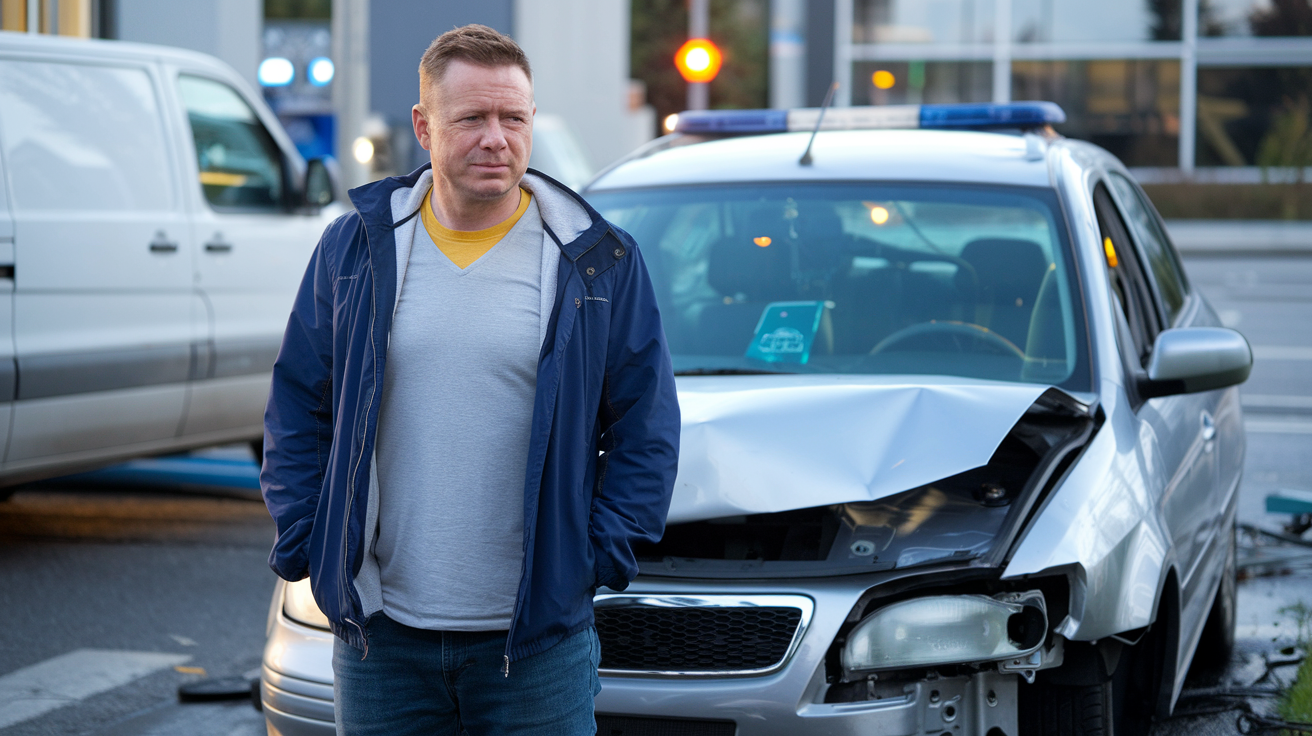
Filing a police report after a car crash isn’t just a good idea—it’s a critical step that protects your rights and creates an official record of what happened. Here’s everything you need to know about this essential post-accident step.
Why Filing a Police Report Matters
I can’t stress this enough: even if the accident seems minor, always file a police report. This official document serves as neutral third-party documentation of the crash.
When you skip this step, you’re basically throwing away powerful evidence. Insurance companies take police reports seriously, and without one, it becomes your word against the other driver’s.
A police report documents:
- Date, time, and location of the accident
- Driver and vehicle information
- Witness statements and contact details
- Road and weather conditions
- Officer’s assessment of what happened
- Citations issued to any drivers
How to File a Police Report
After ensuring everyone’s safety and moving to a safe location:
- Call 911 or the local police non-emergency number
- Stay at the scene until officers arrive
- Provide only factual information—avoid speculation or admitting fault
- Request the report number and officer’s name/badge number
- Ask how to obtain a copy of the report
In some jurisdictions, police won’t respond to accidents without injuries. If that happens, you can still file a report by visiting the nearest police station within 24-72 hours of the crash.
Common Mistakes to Avoid
Don’t fall into these traps when filing your report:
- Admitting fault: Stick to facts, not opinions about who caused the accident
- Declining medical attention: If you’re hurt, say so—downplaying injuries can hurt your claim later
- Providing inaccurate information: Double-check all details before signing
- Failing to mention witnesses: Make sure officers know about and speak to all witnesses
- Not reporting minor accidents: Even fender-benders deserve documentation
What If the Other Driver Doesn’t Want Police Involved?
This is a major red flag. When the other driver tries to talk you out of calling police, they might be:
- Driving without insurance
- Driving without a license
- Driving under the influence
- Hiding something else
Stand your ground. Politely explain that you need a police report for your insurance company and that it protects both parties.
After You File
Get a copy of your police report as soon as possible. Most departments make reports available within 3-10 business days. Review it carefully for errors, and if you find any, contact the department to request corrections.
Keep this document safe—you’ll need it when:
- Filing insurance claims
- Talking with insurance adjusters
- Consulting with attorneys
- Seeking medical expense reimbursement
The small effort of filing a police report can save you countless headaches down the road when dealing with insurance companies and protecting your legal rights after a crash.
Notify Your Insurance Company
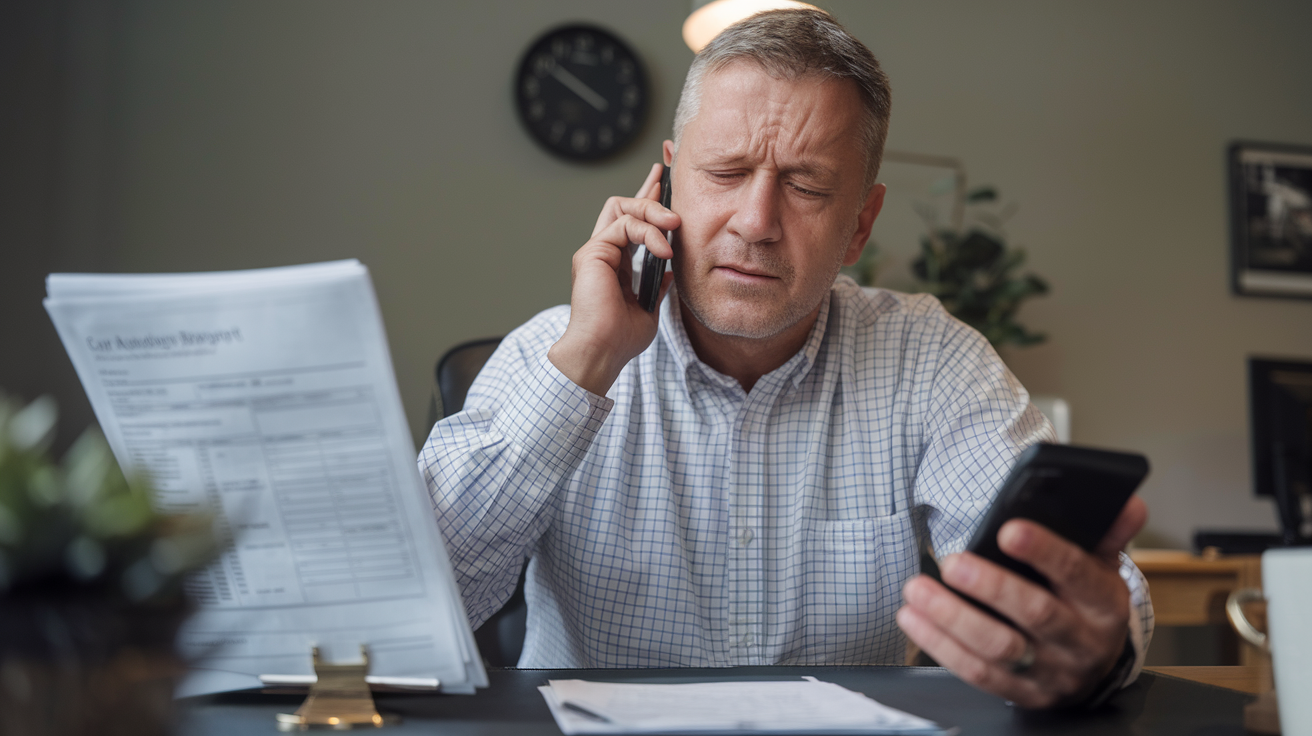
Contact Your Insurer ASAP
Don’t wait to call your insurance company. Pick up the phone within 24 hours of your accident. Most policies actually require immediate notification, and delays could give your insurer a reason to deny your claim.
When you make that call, stick to the basic facts. Share when and where the accident happened, who was involved, and the damage you can see. Don’t volunteer extra information or accept blame for the accident – even saying “I’m sorry” could be twisted into an admission of fault later.
Document Your Conversation
Insurance adjusters are professionals at what they do, and that includes finding ways to minimize payouts. Take notes during every conversation including:
- Date and time of the call
- Name of the representative you spoke with
- Claim number assigned to your case
- Details discussed
- Any promises or commitments made
Request email confirmation of your conversation too. Having a paper trail protects you if the insurance company “forgets” what was discussed.
Watch What You Sign
The paperwork will start flowing quickly after you file a claim. Don’t sign anything without reading it carefully. Insurance companies sometimes slip in releases that limit your compensation or waive important rights.
If you’re unsure about any document, consider consulting with an attorney before signing. This is especially important if you’ve been injured.
Beware of Quick Settlement Offers
That fast settlement check might seem tempting when medical bills are piling up, but it’s rarely in your best interest. Early offers typically come before you fully understand the extent of your injuries or vehicle damage.
Some injuries take weeks or even months to fully manifest. Once you accept a settlement, you generally can’t go back and ask for more money, even if your condition worsens.
Know Your Policy Coverage
Pull out your insurance policy and review exactly what’s covered. Pay special attention to:
- Liability limits
- Collision coverage
- Medical payment provisions
- Uninsured/underinsured motorist coverage
- Rental car reimbursement
Understanding these details helps you advocate for yourself when the adjuster starts discussing your claim.
Consider Getting Independent Estimates
Don’t just accept what the insurance company’s adjuster says about repair costs or vehicle value. Get independent estimates from repair shops you trust, especially if your car has been totaled. The insurance company’s valuation might be significantly lower than actual replacement cost.
No Win. No Fee
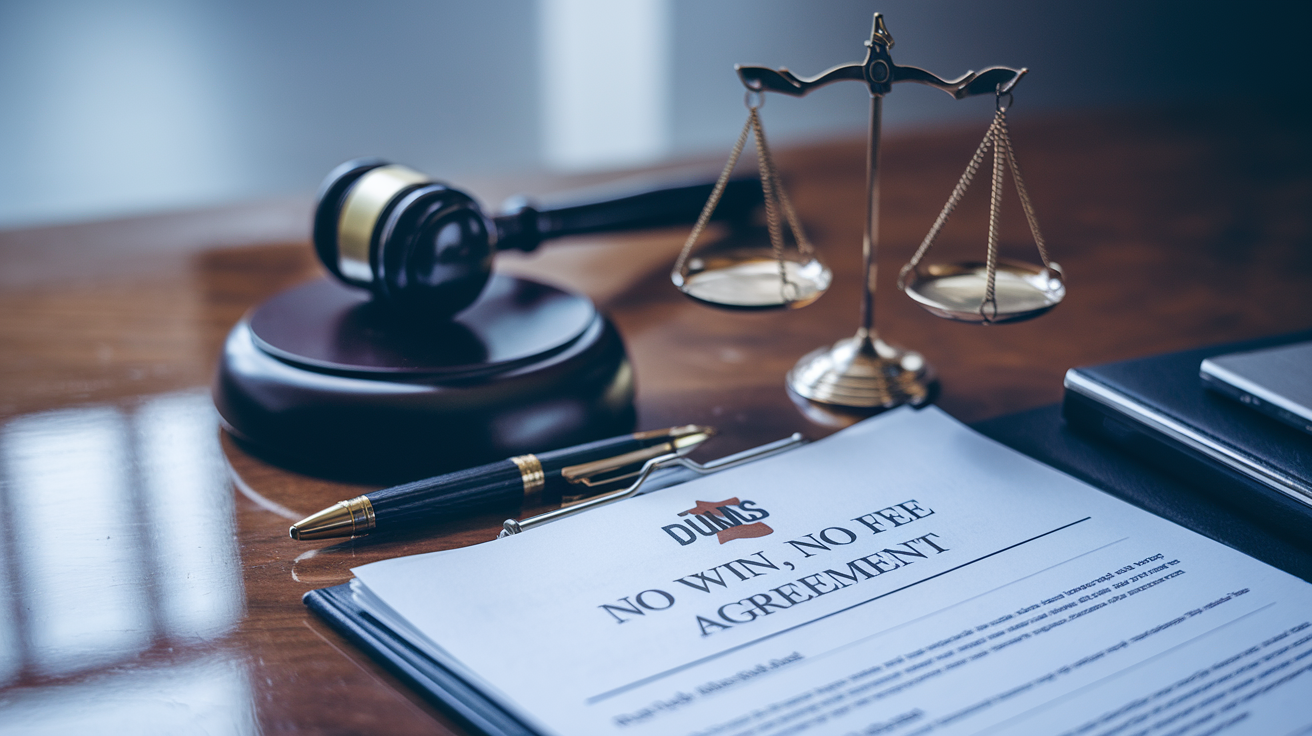
Understanding No Win, No Fee Arrangements
Worried about affording a lawyer after your car crash? I get it. Medical bills are piling up, you might be missing work, and the last thing you need is another expense.
That’s where “no win, no fee” agreements come in. They’re a game-changer for people who need legal help but can’t front the costs.
Here’s the deal: if your lawyer doesn’t win your case, you don’t pay legal fees. Simple as that.
But don’t just take the phrase at face value. These agreements (officially called contingency fee arrangements) have specifics you need to understand.
How It Actually Works
When you sign up with a no win, no fee lawyer after your car crash, here’s what typically happens:
- Your lawyer takes your case without upfront payment
- They handle all the legal heavy lifting
- If you win, they take a percentage of your settlement (usually 25-40%)
- If you lose, you don’t pay their professional fees
But hold up. “No fee” doesn’t always mean “no costs.” Some expenses might still fall on you, like:
- Court filing fees
- Expert witness fees
- Medical record costs
- Administrative expenses
Always ask your lawyer exactly what you might be responsible for, even if you lose.
Questions to Ask Before Signing
Don’t just nod and sign. Ask these questions:
- “What percentage of my settlement will you take?”
- “Are there any costs I’ll have to pay regardless of outcome?”
- “How do you define a ‘win’? Is it any settlement or a minimum amount?”
- “What happens if I decide to drop the case?”
Benefits Worth Considering
These arrangements aren’t just about saving money. They offer real advantages:
- Skin in the game: Your lawyer is motivated to win since they only get paid if you do
- No financial risk: You can pursue justice without worrying about going broke
- Access to quality representation: Even if you’re cash-strapped, you can get an experienced lawyer
Reading the Fine Print
That contract isn’t just formality. Some agreements include sliding scale percentages (the longer your case takes, the more they get), while others might have early settlement discounts.
Pay special attention to clauses about case expenses. Some firms cover all costs until settlement, others expect reimbursement win or lose.
Remember, you can negotiate terms. Don’t like something in the agreement? Speak up before signing.
Contact a Los Angeles Car Accident Lawyer
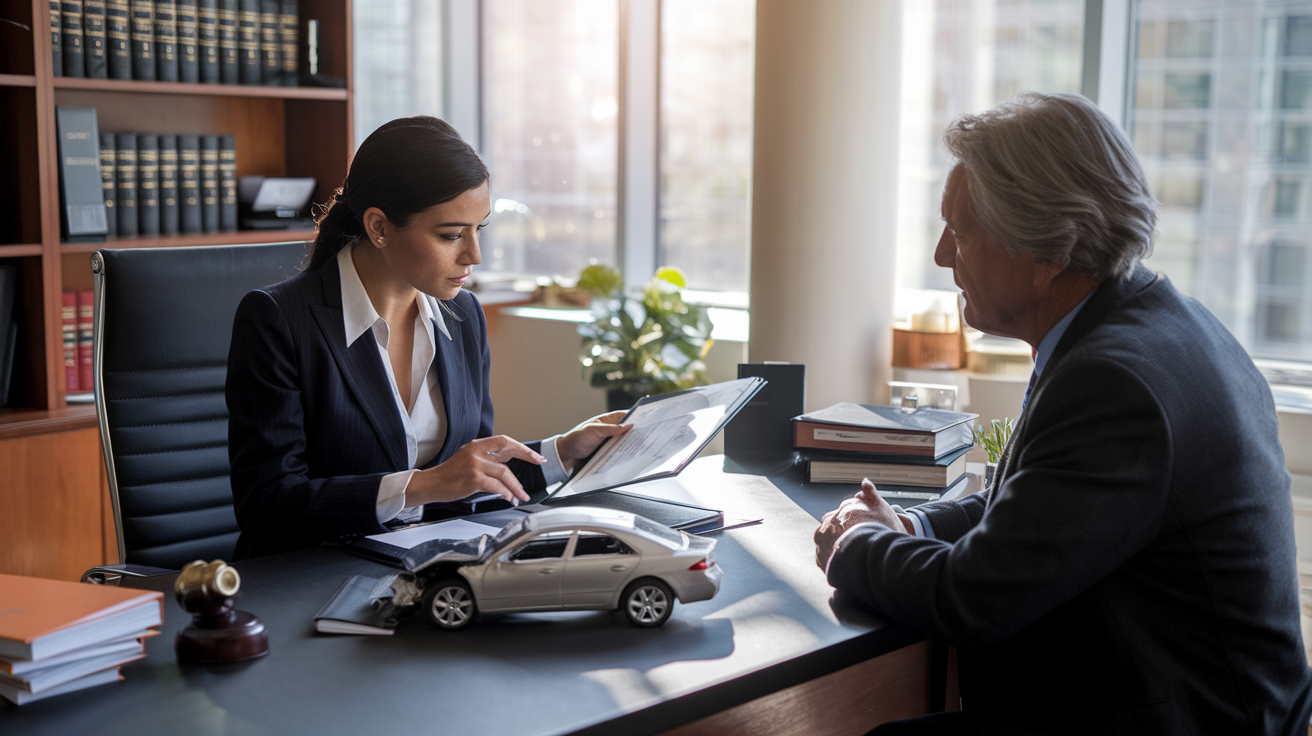
After a car crash, there’s this pivotal moment when you realize you might be in over your head. Insurance adjusters start calling. Medical bills pile up. Your car’s totaled. And somehow, you’re supposed to navigate all this while recovering from injuries.
When to Call an Attorney
Look, not every fender bender requires legal help. But certain situations definitely call for professional backup:
- You’ve suffered serious injuries requiring extensive medical treatment
- The other driver was clearly at fault but their insurance is playing hardball
- Your accident involves complex liability issues (multiple vehicles, commercial trucks, etc.)
- You’re facing significant time off work and lost wages
- The insurance company made a lowball offer that doesn’t cover your damages
The truth? Insurance companies have teams of adjusters and lawyers whose job is to minimize what they pay you. They do this every day. You don’t. This creates a massive power imbalance from the start.
Benefits of Professional Legal Representation
A good Los Angeles car accident lawyer brings several advantages to your case:
- Experience with valuation: They know what your case is truly worth based on similar precedents
- Negotiation skills: They speak the insurance company’s language and won’t be intimidated by tactics
- Investigation resources: They can reconstruct accidents, interview witnesses, and gather crucial evidence
- Medical connections: They work with medical experts who can document the full extent of your injuries
- No upfront costs: Most work on contingency, meaning they only get paid when you do
Timing Matters
Here’s something most people don’t realize: the clock starts ticking immediately after your accident. California has a two-year statute of limitations for personal injury claims. Evidence disappears. Witnesses forget details. Your recollection fades.
Calling an attorney early doesn’t mean you’re being litigious. It means you’re being smart.
What to Look For
Not all attorneys are created equal. When choosing a Los Angeles car accident lawyer, consider:
- Their specific experience with car accident cases
- Their track record of settlements and verdicts
- Their communication style and availability
- Their fee structure (make sure it’s contingency-based)
- What their past clients say about working with them
Take advantage of free consultations. Ask tough questions. Trust your gut feeling about whether they’re truly listening to your specific situation or just giving a rehearsed pitch.
Remember, the right attorney becomes your advocate, your buffer against insurance tactics, and often the difference between a settlement that barely covers your immediate expenses and one that truly compensates you for all you’ve been through.
Follow Up on Medical Care and Document Everything
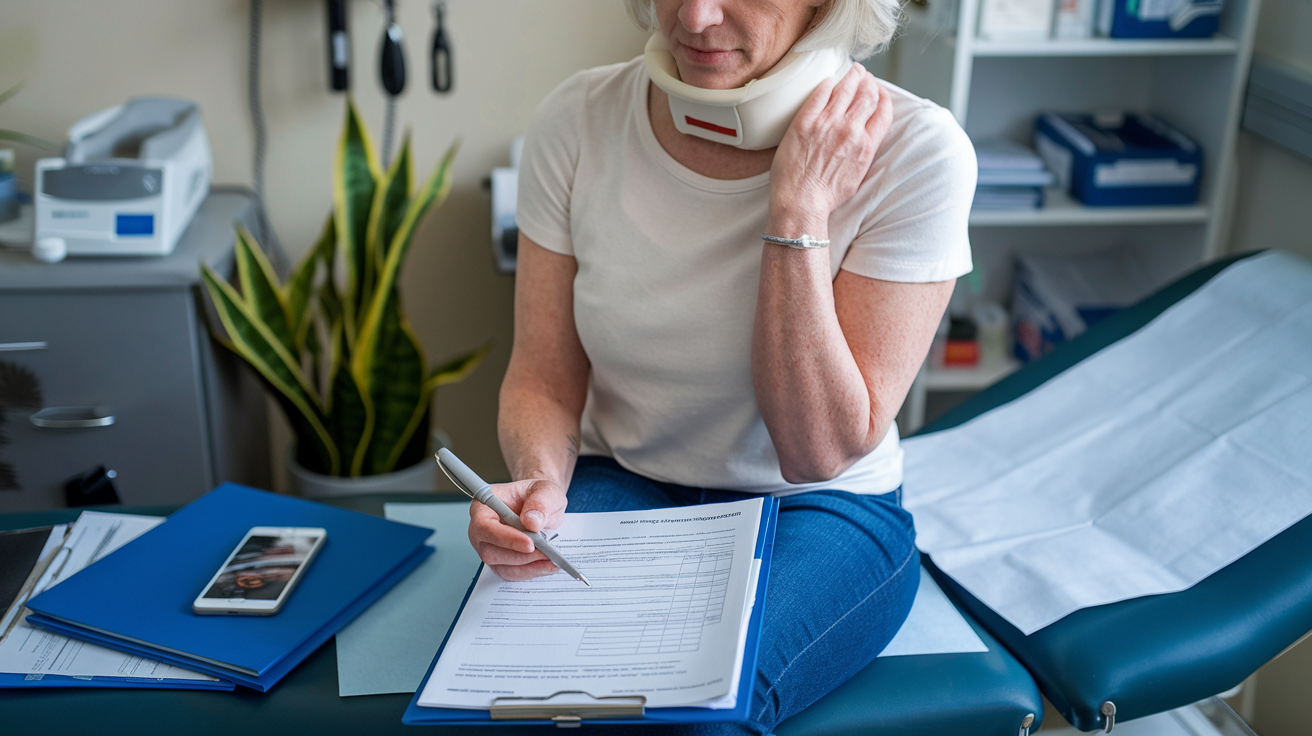
Continuing Your Medical Treatment
Getting medical care right after your crash isn’t enough. Those follow-up appointments? They’re non-negotiable. Skip them and you’re not just risking your health—you’re potentially tanking your claim.
Insurance companies love nothing more than spotting gaps in your treatment. “Oh, you waited three weeks between appointments? Guess you weren’t really hurt that badly!” That’s exactly how they’ll spin it.
Your doctor’s appointments create a paper trail that connects your injuries directly to the crash. Each visit reinforces this connection and documents your recovery journey. Without this documentation, you’re basically handing the insurance company a reason to lowball your claim.
Creating a Recovery Journal
Grab a notebook or use your phone to track everything daily:
- Pain levels (rate from 1-10)
- Activities you can’t do anymore
- Medications you’re taking
- How your injuries affect your sleep
- Emotional impacts (anxiety, depression, etc.)
- Missed work or family events
This journal becomes powerful evidence of how the crash has truly affected your life. Courts and insurance companies value this kind of detailed, contemporaneous documentation.
Keeping All Medical Documents
Every piece of paper matters. Create a dedicated folder (physical or digital) for:
- Hospital discharge papers
- Prescription receipts
- Physical therapy instructions
- Imaging reports (X-rays, MRIs)
- Lab test results
- Doctor’s notes and recommendations
Pro tip: Take photos of everything. Paper gets lost, but digital backups survive.
Tracking Your Expenses
The financial impact of a crash extends far beyond the initial medical bills. Track every single expense related to your injuries:
| Expense Type | What to Document |
|---|---|
| Medical Bills | Keep originals and create digital copies |
| Medication Costs | Save all receipts, including over-the-counter purchases |
| Travel Expenses | Log mileage to/from medical appointments |
| Home Modifications | Document any changes needed due to injuries |
| Hired Help | Record payments for assistance with daily tasks |
Many crash victims miss out on thousands in compensation simply because they didn’t track these “smaller” expenses that add up quickly.
Communicating With Your Healthcare Team
Be completely honest with your doctors about your symptoms and limitations. Their notes will reflect what you tell them, so if you downplay your pain (we all do it sometimes), your medical records won’t accurately capture your suffering.
Ask questions about your treatment plan and make sure you understand the long-term outlook for your injuries. This information becomes crucial when determining the full value of your claim.
Have You or a Loved One Been Injured in a Los Angeles Car Accident?
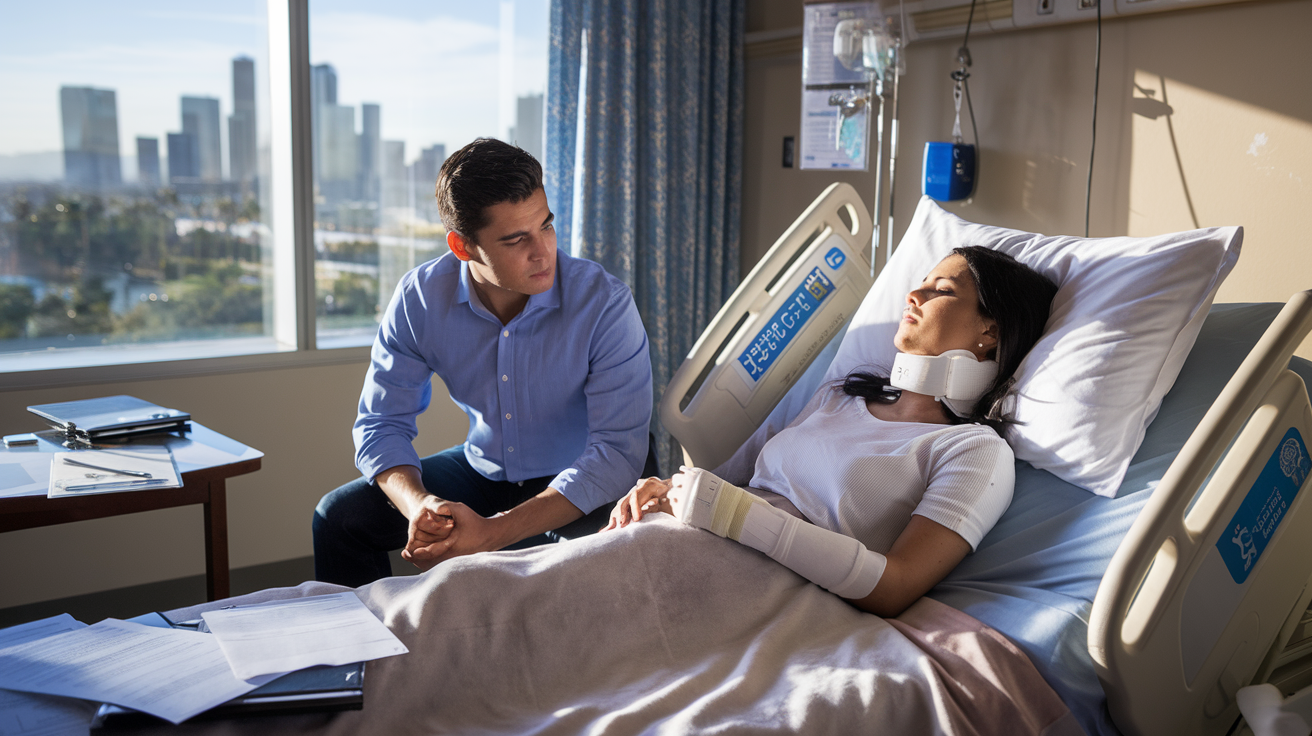
Dealing with Trauma and Injuries
The aftermath of a car accident can leave you physically hurt and emotionally shaken. If you’re reading this in Los Angeles, you’re not alone. Thousands of Angelenos face this reality every year on our congested freeways and busy streets.
Serious injuries don’t always show symptoms immediately. That nagging pain in your neck might seem minor now, but could develop into something debilitating weeks later. This is why immediate medical attention is crucial, even if you feel “mostly fine.”
Common injuries from LA car accidents include:
- Whiplash and neck trauma
- Back injuries and spinal damage
- Traumatic brain injuries
- Broken bones
- Internal bleeding
- Psychological trauma and PTSD
When to Contact a Los Angeles Attorney
Navigating the aftermath alone can be overwhelming. Insurance companies aren’t your friends. They’re businesses looking to minimize payouts, regardless of how badly you’re hurting.
A local attorney understands California’s specific laws and the complex LA traffic situation. They’ll advocate for you when you’re most vulnerable.
Consider calling a lawyer immediately if:
- You’ve suffered significant injuries
- The accident involved multiple vehicles
- Fault is being disputed
- An uninsured driver hit you
- Your insurance is giving you the runaround
- You’re missing work due to injuries
What a Good Car Accident Lawyer Will Do
The right attorney becomes your shield when you’re most vulnerable. They’ll:
- Investigate your accident thoroughly
- Gather evidence before it disappears
- Handle all communication with insurance companies
- Calculate your true damages (including future medical needs)
- Fight for maximum compensation
Understanding Compensation Options
Car accidents can derail your entire life. Medical bills pile up while you’re unable to work. Compensation typically covers:
- Medical expenses (past and future)
- Lost wages and diminished earning capacity
- Property damage
- Pain and suffering
- Emotional distress
Most LA car accident lawyers work on contingency, meaning they only get paid if you win. This gives you access to quality legal help without upfront costs during an already financially stressful time.
Taking the First Step
Time is critical after an accident. California has a two-year statute of limitations for personal injury claims, but evidence disappears much faster.
Don’t let insurance companies pressure you into quick settlements. Once you sign, you typically can’t claim additional compensation when new symptoms appear later.
Getting proper help after a Los Angeles car accident isn’t just about compensation—it’s about protecting your future and ensuring you have the resources needed for a complete recovery.

Being involved in a car crash can be overwhelming, but taking immediate action is crucial for protecting your rights. From ensuring safety and gathering evidence to filing police reports and seeking medical care, every step you take following an accident matters. Remember that timely communication with your insurance company and proper documentation of damages and injuries will significantly strengthen your case.
If you or a loved one has been injured in a Los Angeles car accident, don’t navigate this challenging time alone. A qualified car accident lawyer can help you understand your options, including “No Win, No Fee” arrangements that make legal representation accessible. By securing professional legal support, you can focus on recovery while ensuring your rights are protected and you receive the compensation you deserve for your injuries and damages.


